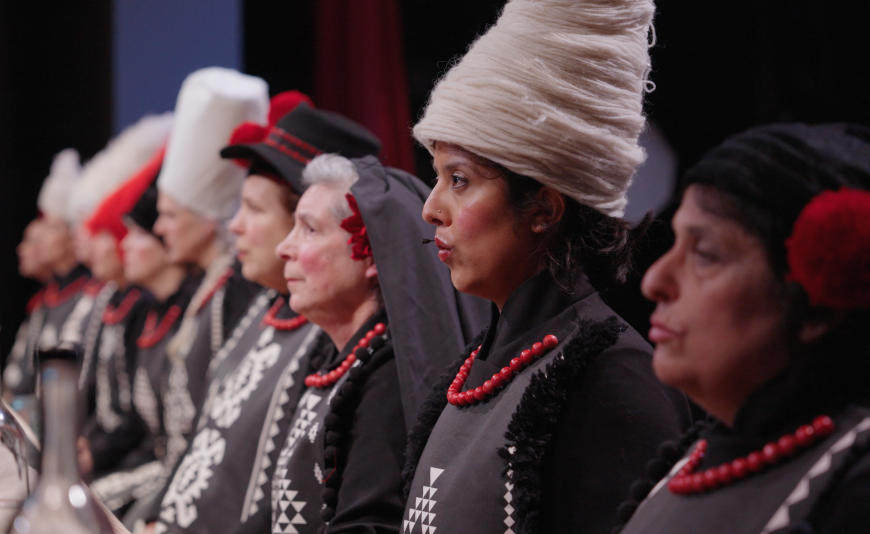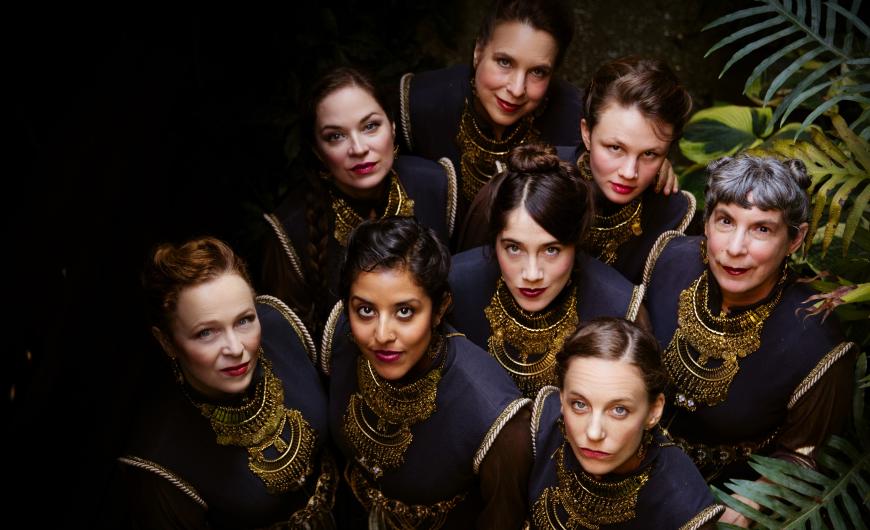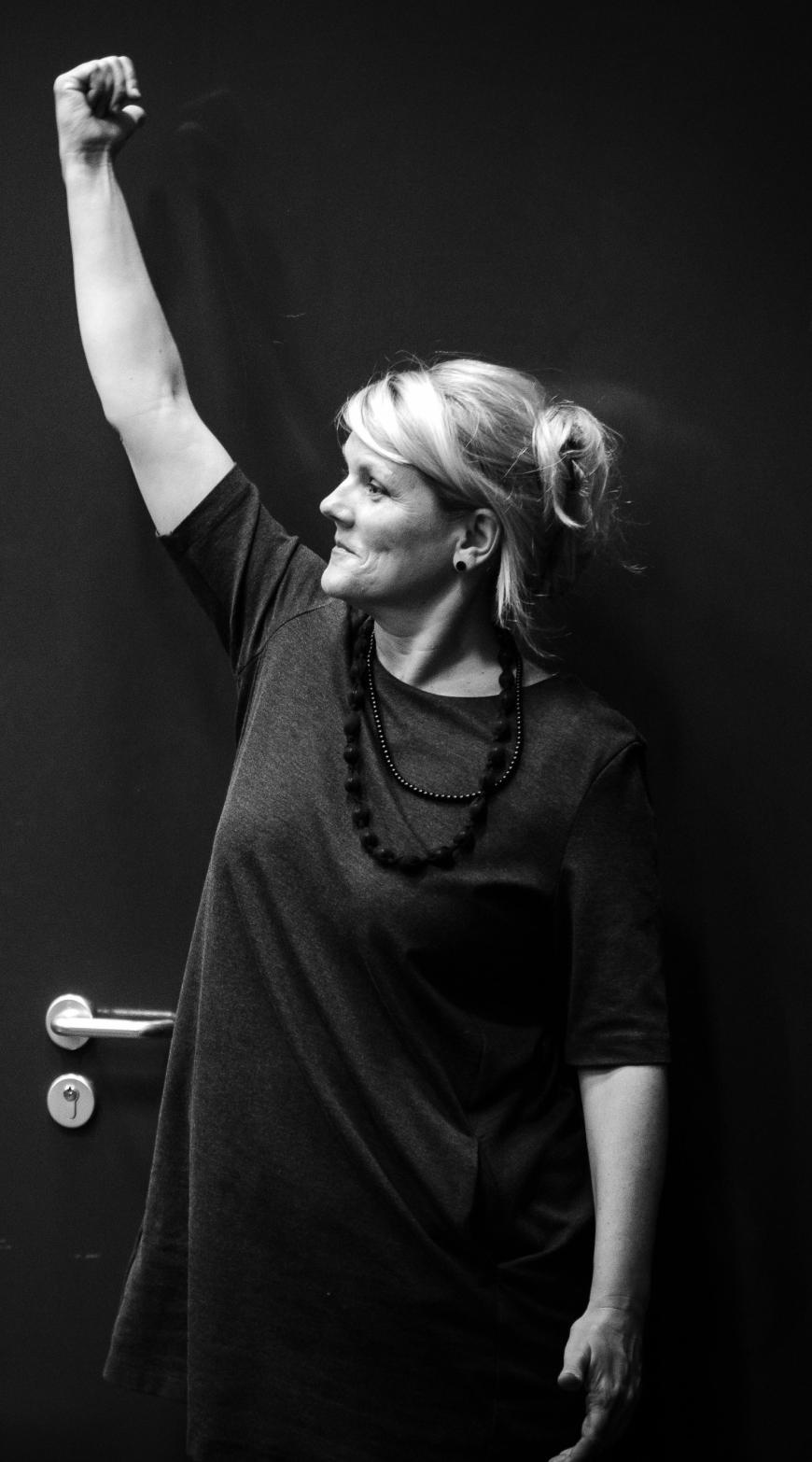
The path for conductor and director Karmina Šilec hasn’t been straightforward. But then again, you wouldn’t expect it to be with a work like BABA: The Life and Death of Stana, Šilec’s new opera that has as its subject the history, culture, and lives of sworn virgins of the Balkan highlands. After several years and a series of fellowships and residencies, BABA has reached the last stages of its development at Oakland’s Mills College at Northeastern University, where Šilec has been working this winter with multiple collaborating artists, including the cast — namely, the Bay Area-based Kitka Women’s Vocal Ensemble. Now, the work is slated for its world premiere Feb. 23–26 at Z Space in San Francisco.
In its 43rd season, Kitka is an all-woman ensemble whose expertise is in performing the traditional songs and vocal techniques of Eastern Europe. Devoted to developing new audiences for this music, Kitka has collaborated with or commissioned new works by composers David Lang, Meredith Monk, Pauline Oliveros, Chen Yi, Janet Kutulas, Linda Tillery, Janika Vandervelde, Richard Einhorn, and others. For BABA, the nine-member group has added two guest artists, multi-instrumentalist Shira Kammen and actor/singer Beth Wilmurt.

BABA is billed as “a multidisciplinary and non-narrative take on Balkan epic storytelling traditions, while exploring themes of gender, custom, and the complexities of interpreting the category of the sworn virgin through a liberal Western gaze.” Sworn virginhood is a practice found in remote rural regions of Albania, Montenegro, Bosnia and Herzegovina, Kosovo, and Serbia. Born as women, sworn virgins — for a multiplicity of nonsexual, practical reasons having to do with survival, responsibility to family, or a desire to escape the oppressive reality and restricted rights and freedoms for women in patriarchal regions — become men. Importantly, the decision to take vows of chastity and celibacy is not attributed to sexual preference or a sense of being innately male.
In her artistic practice, Šilec employs Choregie, a research-oriented creative meta composition process in which all elements of a performance are developed simultaneously. This means the artists with whom she works are asked during the creative process to shift in the moment, rapidly and fluidly, between mediums as the work is developed. Music is not allowed to dominate movement or vice versa. Costuming, lighting, staging, and visual elements such as projections are not stepsisters to a score or choreography but are introduced from day one. Less tangible elements have an equal seat at the table: imagination, somatics, didactics, team building, mind-body connectivity, rituals, and more. The result is a playground, but a challenging one for artists like Kitka, whose usual process is to master the music then apply attention and energy to the “add-ons.”

“This project is a huge collection,” Šilec says:
This is the last stage in a lucky process that began at Harvard University with deep research into the sworn virgins. I was fascinated with the images and the parts of a face that show if it is a woman or not. But then, I realized I was acting as an anthropological tourist, and I was ashamed.
I transitioned immediately and started to write books about BABA. I wrote three books, and after that, I entered another phase of the work. Being a female conductor from age 15, I already had many experiences as a woman working in a man’s world. This is a project that therefore speaks far beyond the Balkans to women in a democratic liberal society. Are we really that different? Is our system where marriage and families are ultra-important — are we not still living in an illusion, in a false image? Is there not still misogyny and patriarchy in the West?
I hold a mirror to our choices and lifestyle today [by] using music that is folk, digital, traditional, and contemporary.”
Šilec is mindful of the ways in which sworn virgins have been depicted before. “There have been press, media, and filmmakers who traveled to the Balkans with the dominant Western notions of sworn virgins. I want to break the idea of putting them onstage as archival specimens or as mysterious, hard-to-find products. I want to present them as normal people — happy, unhappy, as you and I are.”
Bursting out of these narrow depictions had to happen from the project’s origins, Šilec insists. And that’s where Choregie came in. “In this non-narrative form, the relationship between elements differs,” she says. “For example, you don’t have a story, so we don’t have to bring a chair at a specific moment just because we know a performer is writing at a desk. Because they are developed simultaneously, the elements are not in a hierarchical situation. They’re equal and don’t subordinate one to another. It can be image, spoken word, movement, or music that are prominent at one moment or another. It’s for the audience to find their own message.”
And Šilec praises the singers of Kitka for their ability to bring this process to life. “They have extended capabilities with different colors. This music is newly composed, meaning we use certain timbres in contemporary ways, and they are capable of all of that. We search for vocal placement, projection, theatricality. We decide what atmosphere we reach for, what energy we use. With Kitka, it is easier because they already have these vast different textures in their repertoire. They have within their voices a storage of different sounds — an archive, a library.”


